Mint tea
| Mint tea | |
|---|---|
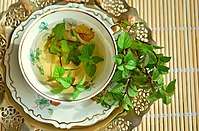 | |
| Type | Herbal tea |
|
| |
| Other names |
|
| Origin | Various |
|
| |
| Quick description | Tea made from mint leaves |
|
| |
| Temperature | 95 °C (203 °F) |
| Time | 3 minutes |
| Korean name | |
| Hangul | 박하차 |
|---|---|
| Hanja | 薄荷茶 |
| Revised Romanization | bakha-cha |
| McCune–Reischauer | pakha-ch'a |
| IPA | [pa.kʰa.tɕʰa] |
Mint tea is a herbal tea made by infusing mint leaves in hot water.[1] Mint tea made with peppermint leaves is called peppermint tea, and mint tea made with spearmint is called spearmint tea. There also exists teas that infuse peppermint and spearmint leaves. In Korea, traditional mint tea called bakha-cha (박하차) is made with East Asian wild mint leaves.[2]
Due to the high content of essential oils in leaves (1 - 2.5%), especially menthol, mint tea is popular for its curative effects. Affecting the digestive system and excretion of gastric juices, it acts as an anti-inflammatory.
Therapeutic effects
Although no human clinical studies have been conducted on the health benefits or risks of peppermint tea, historically it has been viewed to be good for health because of the menthol it contains, where it may relieve problems such as irritable bowel syndrome, nausea and vomiting, diarrhea, headache and infant colic. Its mint flavor can help remedy bad breath. It also may control mild asthma, stress and prevent the common cold. In some countries, commercial mint tea lists these effects on its labeling. It has also been shown that peppermint oil is effective as an antispasmodic during upper gastrointestinal endoscopy and colonoscopy.
Risks
Mint tea has relaxing properties and therefore can relax the lower esophageal sphincter, allowing the content of the stomach to rise to the esophagus. For this reason, those suffering from gastroesophageal reflux should in principle avoid its consumption. On the other hand, precisely because it calms and relaxes the muscles of the intestinal tract, thus reducing spasms, peppermint can have beneficial effects in the treatment of digestive symptoms such as diarrhea and colic.[3]
Excessive ingestion of peppermint may be toxic, as pure menthol is poisonous.
Gallery
- Spearmint tea
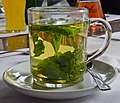 Peppermint tea
Peppermint tea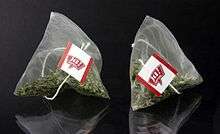 Peppermint tea (tea bag)
Peppermint tea (tea bag)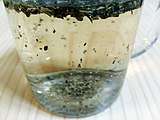 Infusing bakha-cha
Infusing bakha-cha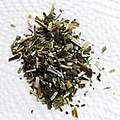 Bakha-cha (dried leaves)
Bakha-cha (dried leaves) Serving of mint tea
Serving of mint tea Glass of mint besides mint leaves
Glass of mint besides mint leaves
See also
- Maghrebi mint tea, green tea prepared with mint
References
- ↑ "mint tea". Oxford Dictionaries. Retrieved 24 February 2018.
- ↑ Jeong, Dong-hyo; Yun, Baek-hyeon; Yi, Yeong-hui, eds. (2012). "Cha-ui bullyu-wa jongnyu". Cha saenghwal munhwa daejeon (in Korean). Seoul, Korea: Hongikjae. ISBN 978-89-714-3351-5. Retrieved 24 February 2018 – via Naver.
- ↑ McKay DL, Blumberg JB (August 2006). «A review of the bioactivity and potential health benefits of peppermint tea (Mentha piperita L.)». Phytother Res 20 (8): 619-33.